Putin 俄罗斯总统普京英语介绍PPT
- 格式:ppt
- 大小:2.33 MB
- 文档页数:14
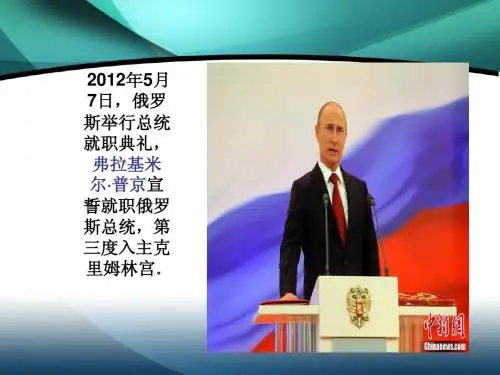
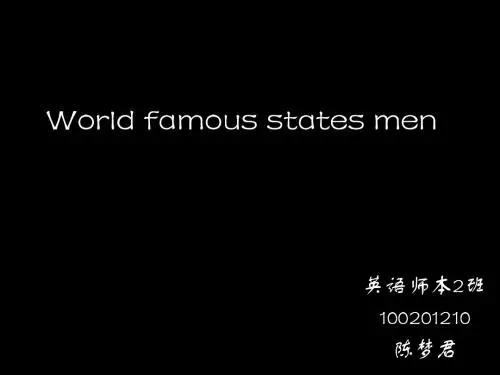
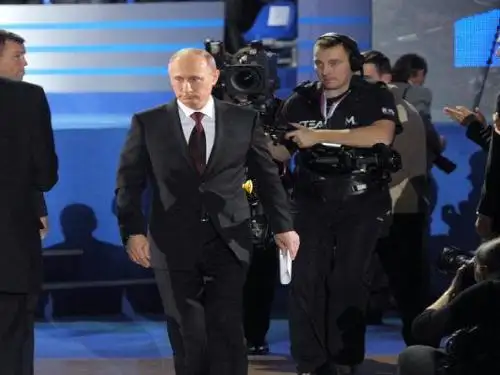
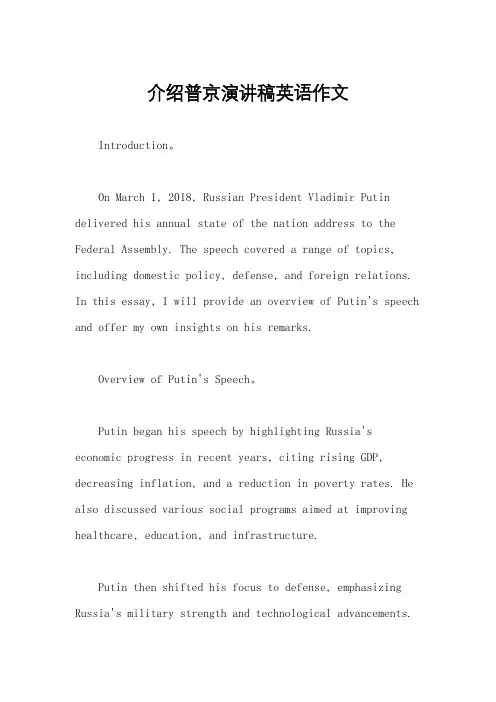
介绍普京演讲稿英语作文Introduction。
On March 1, 2018, Russian President Vladimir Putin delivered his annual state of the nation address to the Federal Assembly. The speech covered a range of topics, including domestic policy, defense, and foreign relations. In this essay, I will provide an overview of Putin's speech and offer my own insights on his remarks.Overview of Putin's Speech。
Putin began his speech by highlighting Russia's economic progress in recent years, citing rising GDP, decreasing inflation, and a reduction in poverty rates. He also discussed various social programs aimed at improving healthcare, education, and infrastructure.Putin then shifted his focus to defense, emphasizing Russia's military strength and technological advancements.He highlighted recent developments in nuclear weapons, including the development of a new missile system that he claimed was "invincible." He also condemned the United States for its missile defense system, which he argued was a threat to global security.In addition to defense, Putin discussed Russia's foreign policy, emphasizing the need for international cooperation and respect for national sovereignty. He criticized Western countries for their interference in other nations' affairs and accused them of promoting "chaos and instability."Finally, Putin addressed domestic issues, including corruption, crime, and social inequality. He pledged to crack down on corruption and improve the justice system, while also promising to address the needs of Russia's most vulnerable citizens.My Insights on Putin's Speech。
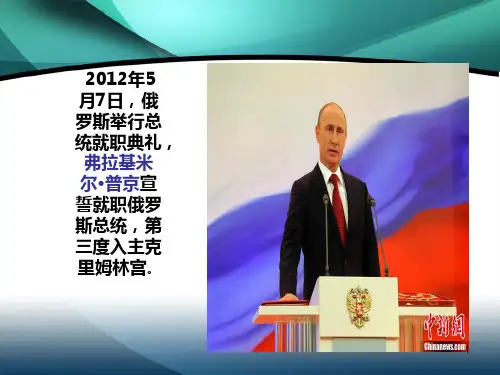
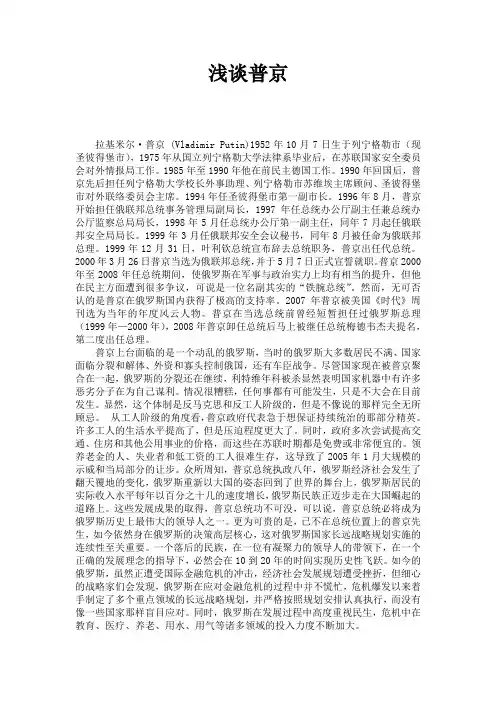
浅谈普京拉基米尔·普京 (Vladimir Putin)1952年10月7日生于列宁格勒市(现圣彼得堡市),1975年从国立列宁格勒大学法律系毕业后,在苏联国家安全委员会对外情报局工作。
1985年至1990年他在前民主德国工作。
1990年回国后,普京先后担任列宁格勒大学校长外事助理、列宁格勒市苏维埃主席顾问、圣彼得堡市对外联络委员会主席。
1994年任圣彼得堡市第一副市长。
1996年8月,普京开始担任俄联邦总统事务管理局副局长,1997年任总统办公厅副主任兼总统办公厅监察总局局长,1998年5月任总统办公厅第一副主任,同年7月起任俄联邦安全局局长。
1999年3月任俄联邦安全会议秘书,同年8月被任命为俄联邦总理。
1999年12月31日,叶利钦总统宣布辞去总统职务,普京出任代总统。
2000年3月26日普京当选为俄联邦总统,并于5月7日正式宣誓就职。
普京2000年至2008年任总统期间,使俄罗斯在军事与政治实力上均有相当的提升,但他在民主方面遭到很多争议,可说是一位名副其实的“铁腕总统”。
然而,无可否认的是普京在俄罗斯国内获得了极高的支持率。
2007年普京被美国《时代》周刊选为当年的年度风云人物。
普京在当选总统前曾经短暂担任过俄罗斯总理(1999年—2000年),2008年普京卸任总统后马上被继任总统梅德韦杰夫提名,第二度出任总理。
普京上台面临的是一个动乱的俄罗斯,当时的俄罗斯大多数居民不满、国家面临分裂和解体、外资和寡头控制俄国,还有车臣战争。
尽管国家现在被普京聚合在一起,俄罗斯的分裂还在继续,利特维年科被杀显然表明国家机器中有许多恶劣分子在为自己谋利。
情况很糟糕,任何事都有可能发生,只是不大会在目前发生。
显然,这个体制是反马克思和反工人阶级的,但是不像说的那样完全无所顾忌。
从工人阶级的角度看,普京政府代表急于想保证持续统治的那部分精英。
许多工人的生活水平提高了,但是压迫程度更大了。
同时,政府多次尝试提高交通、住房和其他公用事业的价格,而这些在苏联时期都是免费或非常便宜的。
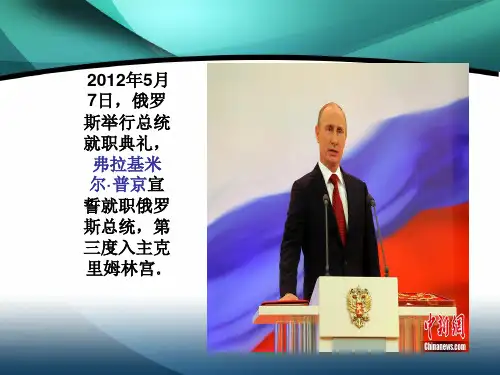
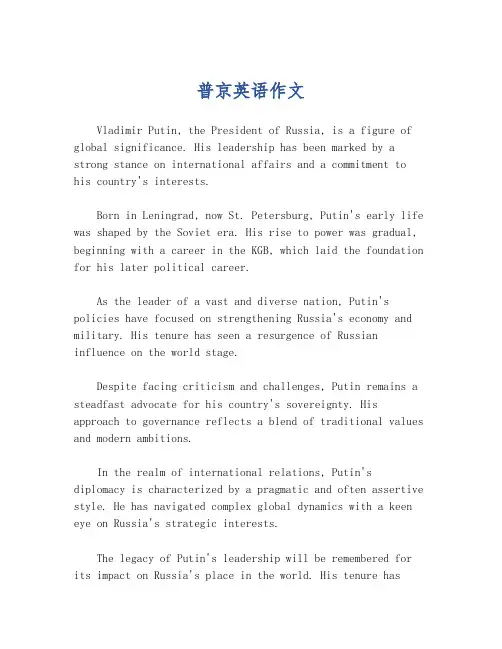
普京英语作文Vladimir Putin, the President of Russia, is a figure of global significance. His leadership has been marked by a strong stance on international affairs and a commitment to his country's interests.Born in Leningrad, now St. Petersburg, Putin's early life was shaped by the Soviet era. His rise to power was gradual, beginning with a career in the KGB, which laid the foundation for his later political career.As the leader of a vast and diverse nation, Putin's policies have focused on strengthening Russia's economy and military. His tenure has seen a resurgence of Russian influence on the world stage.Despite facing criticism and challenges, Putin remains a steadfast advocate for his country's sovereignty. His approach to governance reflects a blend of traditional values and modern ambitions.In the realm of international relations, Putin's diplomacy is characterized by a pragmatic and often assertive style. He has navigated complex global dynamics with a keen eye on Russia's strategic interests.The legacy of Putin's leadership will be remembered for its impact on Russia's place in the world. His tenure hasbeen a period of significant change and development for the nation.In conclusion, Putin's presidency has been a defining chapter in Russia's modern history. His influence extends beyond the borders of his country, shaping the course of international politics and diplomacy.。
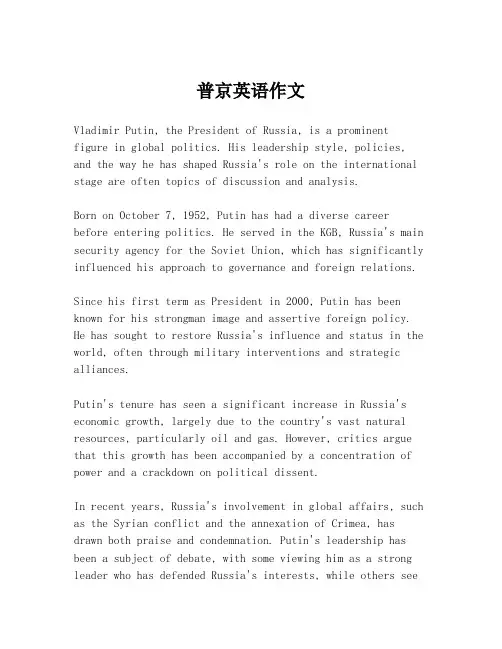
普京英语作文Vladimir Putin, the President of Russia, is a prominentfigure in global politics. His leadership style, policies, and the way he has shaped Russia's role on the international stage are often topics of discussion and analysis.Born on October 7, 1952, Putin has had a diverse career before entering politics. He served in the KGB, Russia's main security agency for the Soviet Union, which has significantly influenced his approach to governance and foreign relations.Since his first term as President in 2000, Putin has been known for his strongman image and assertive foreign policy. He has sought to restore Russia's influence and status in the world, often through military interventions and strategic alliances.Putin's tenure has seen a significant increase in Russia's economic growth, largely due to the country's vast natural resources, particularly oil and gas. However, critics argue that this growth has been accompanied by a concentration of power and a crackdown on political dissent.In recent years, Russia's involvement in global affairs, such as the Syrian conflict and the annexation of Crimea, has drawn both praise and condemnation. Putin's leadership has been a subject of debate, with some viewing him as a strong leader who has defended Russia's interests, while others seehim as an authoritarian figure who undermines democratic values.Despite the controversies, Putin remains a central figure in Russia's political landscape. His influence extends beyond his country's borders, making him a key player in international relations and a subject of interest for those studying global politics.In conclusion, Vladimir Putin's presidency has been marked by a desire to assert Russia's power and influence on the world stage. His policies and actions have had a significant impact on Russia's economy, society, and international standing. As Russia continues to play a crucial role in global affairs, Putin's leadership will undoubtedly remain a topic ofinterest and scrutiny.。
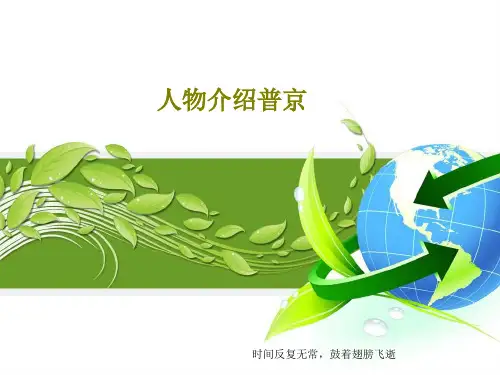
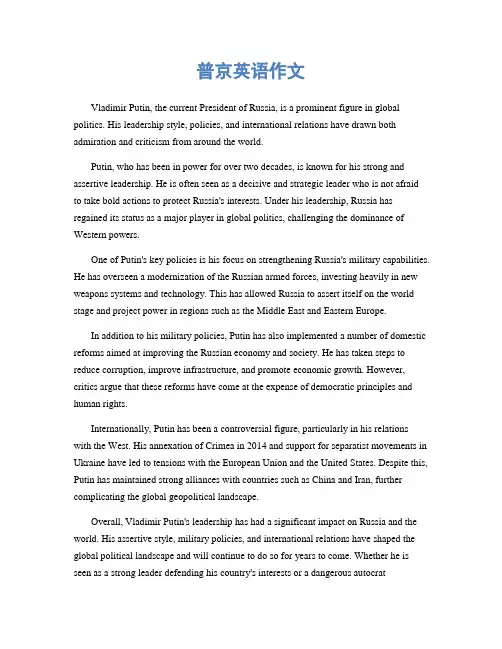
普京英语作文Vladimir Putin, the current President of Russia, is a prominent figure in global politics. His leadership style, policies, and international relations have drawn both admiration and criticism from around the world.Putin, who has been in power for over two decades, is known for his strong and assertive leadership. He is often seen as a decisive and strategic leader who is not afraidto take bold actions to protect Russia's interests. Under his leadership, Russia has regained its status as a major player in global politics, challenging the dominance of Western powers.One of Putin's key policies is his focus on strengthening Russia's military capabilities. He has overseen a modernization of the Russian armed forces, investing heavily in new weapons systems and technology. This has allowed Russia to assert itself on the world stage and project power in regions such as the Middle East and Eastern Europe.In addition to his military policies, Putin has also implemented a number of domestic reforms aimed at improving the Russian economy and society. He has taken steps to reduce corruption, improve infrastructure, and promote economic growth. However, critics argue that these reforms have come at the expense of democratic principles and human rights.Internationally, Putin has been a controversial figure, particularly in his relations with the West. His annexation of Crimea in 2014 and support for separatist movements in Ukraine have led to tensions with the European Union and the United States. Despite this, Putin has maintained strong alliances with countries such as China and Iran, further complicating the global geopolitical landscape.Overall, Vladimir Putin's leadership has had a significant impact on Russia and the world. His assertive style, military policies, and international relations have shaped the global political landscape and will continue to do so for years to come. Whether he is seen as a strong leader defending his country's interests or a dangerous autocratthreatening global stability, there is no denying that Putin's influence is felt far beyond Russia's borders.。
俄罗斯总统普京简历弗拉基米尔·弗拉基米罗维奇·普京 (Vladimir Putin) 1952年10月7日生于列宁格勒市(今圣彼得堡市),1975年毕业于列宁格勒大学法律系,进入苏联国家安全委员会工作,其中1985年至1990年在民主德国工作。
1990年回国后,普京先后担任列宁格勒大学校长外事助理、圣彼得堡市市长顾问、市政府对外联络委员会主席和圣彼得堡市第一副市长。
普京1996年8月出任俄总统事务管理局副局长,1997年3月任俄总统办公厅副主任兼监察局局长,1998年5月任总统办公厅第一副主任,7月任俄联邦安全总局局长。
他1999年3月任俄联邦安全会议秘书,8月9日被任命为第一副总理、代总理,8月16日就任总理。
1999年12月31日,俄罗斯总统叶利钦宣布辞去总统职务,并宣布由普京少年时代的普京代行总统职务。
2000年3月26日和,普京两次赢得总统选举。
执政八年来,普京遵循恢复俄罗斯大国形象的初衷,对内采取相应举措,加强联邦政权的权力,整顿经济秩序、打击金融寡头,加强军队建设;对外努力改善国际环境、拓展空间、维护本国利益,在国际舞台上逐步恢复强国地位。
通过不懈的努力,普京使一个人心涣散、经济衰弱、民生困顿的俄罗斯重新振作起来,成为一个政治稳定、经济持续增长、人民生活水平明显提高、国际地位显著提升的国家。
目前俄罗斯已成为世界第七大经济体。
俄罗斯黄金外汇储备从普京执政之初的150亿美元增加到如今的5000多亿美元。
由于政绩卓著,普京多年来深受民众拥戴,支持率一直在70%以上。
2008年5月,。
5月7日,俄罗斯新总统梅德韦杰夫宣誓就职后提名普京为新一届政府总理。
8日,。
2011年11月27日,普京被俄罗斯执政党统一俄罗斯党(统俄党)正式。
12月20日,俄罗斯中央选举委员会发布消息说,。
普京性格坚韧,很少表露感情,工作作风果断干练而谨慎。
他还酷爱运动,特别爱好桑勃式摔跤、柔道和山地滑雪,大学时代荣获过桑勃式摔跤冠军,是1974年列宁格勒的柔道冠军,并入选运动健将候选人之列。
Chinese President Jiang Zemin is due in Moscow today Sunday for a summit meeting with Russian President Vladimir Putin. Over the next four days Mr Jiang will meet with Russian President Vladimir Putin and other prominent Russian leaders for meetings that to set the basis for a new relationship between the two countries. On Monday Russia and China are set to sign a friendship and cooperation pact, the first major treaty between them since the fall of Soviet Union ten years ago.注解:due: 应得的,预期的prominent:卓越的,显著的,突出的pact:合同,公约,协定Although the treaty is considered here with relatively bland, consisting of little more than declarations of friendship and cooperation in the new century, it has raised some unease in Washington. China has said the pact has no military implications, and the United States should not view it as a strategic threat. Just last week President Jiang told Russian news agencies that China's ties with the United States are improving, after a difficult period marked by a recent collision between a US spy plane and a Chinese fight jet.注解:bland:温和的,柔和的unease:不舒适,不安implication:牵连,含义,暗示strategic:战略的,战略上的news agency:通讯社collision:碰撞,冲突这段听力的大意是这样的:尽管这个条约被认为是温和的,但是在美国还是造成了一定的不安,中国已经声称该协定没有任何军事含义,美国不应把它看作战略威胁。
俄罗斯政治英语Russia's political landscape is complex and often subject to debate and controversy. The country's political system is characterized by a strong executive branch, dominated by the President, and a legislature with limited power. The ruling party, United Russia, has a strong grip on power and often faces accusations of electoral fraud and suppression of political opposition. The state-run media also plays a significant role in shaping public opinion and supporting the government's agenda. Overall, Russia's political environment is characterized by a lack of genuine political competition and limited freedom of expression.俄罗斯的政治格局复杂,经常受到辩论和争议。
该国的政治体系以强大的行政部门为特征,总统占主导地位,而立法机构的权力有限。
执政党统一俄罗斯党牢牢掌握着权力,并经常面临选举舞弊和政治反对派压制的指控。
国有媒体也在塑造民意和支持政府议程方面发挥着重要作用。
总的来说,俄罗斯的政治环境以缺乏真正的政治竞争和有限的言论自由为特征。
The President of Russia holds significant power in the country's political system. The President is the head of state and government and is responsible for shaping thecountry's domestic and foreign policies. The current President, Vladimir Putin, has been in power for over two decades and has maintained a strong grip on the political landscape. However, his rule has been marked by allegations of corruption, human rights abuses, and suppression of political opposition.俄罗斯总统在该国的政治体系中拥有重大权力。
普京英语作文Vladimir Putin, born on October 7, 1952, in Leningrad (now St. Petersburg), Russia, has been a pivotal figure in global politics for over two decades. As the President of Russiafrom 1999 to 2008, and again from 2012 to the present, Putin has been a dominant force in shaping the country's policies and its stance on the world stage.Early Life and Career:Putin's journey to the presidency began with a humble start. He grew up in a working-class family and was known for his interest in sports, particularly martial arts and judo. After graduating from Leningrad State University with a law degree, he entered the field of intelligence, working for the KGB,the Soviet Union's main security agency. This experiencewould later shape his approach to governance andinternational relations.Rise to Power:Putin's rise to power was swift and strategic. After the fall of the Soviet Union, he served as the Mayor of St. Petersburg before being appointed by President Boris Yeltsin as hisPrime Minister in 1999. Later that year, Yeltsin resigned,and Putin became the acting president. He won thepresidential election in 2000, marking the beginning of his long tenure as Russia's leader.Domestic Policies and Economy:Under Putin's leadership, Russia has seen significant economic growth, largely due to the rise in oil prices. He has implemented policies aimed at stabilizing the economy and reducing the influence of oligarchs who had amassed great wealth and power following the Soviet collapse. However, critics argue that Putin's government has also been characterized by increasing authoritarianism, with the suppression of political opposition and the curtailment of civil liberties.Foreign Policy and International Relations:Putin's foreign policy has been assertive, with Russia reasserting its influence in the international arena. His administration has been involved in various conflicts, including the annexation of Crimea in 2014 and the ongoing involvement in the Syrian civil war. These actions have led to strained relations with Western countries, particularly the United States and members of the European Union.Controversies and Legacy:The Putin era has been marked by numerous controversies, including allegations of election interference in foreign countries, cyber-attacks, and the use of state-sponsored disinformation. Despite this, Putin remains popular among many Russians for restoring a sense of national pride and global influence that was diminished after the Soviet Union's collapse.Conclusion:Vladimir Putin is a complex figure whose impact on Russia and the world is profound and multifaceted. While his leadershiphas brought about economic stability and a resurgence of Russian influence, it has also been a source of concern dueto its authoritarian tendencies and aggressive foreign policy. As the world continues to grapple with the implications of Putin's actions, his legacy remains a topic of intense debate and scrutiny.。
介绍普京英语作文高中Vladimir Putin, the President of Russia, is a prominentfigure who has been in the global spotlight for many years. Born on October 7, 1952, in Leningrad, now known as Saint Petersburg, Putin has had a varied career that includes serving in the KGB, the main security agency for the Soviet Union, and later as a political leader.Putin's rise to power began in 1991 when he entered politics after the dissolution of the Soviet Union. He quickly climbed the ranks and became the President of Russia in 2000, a position he has held for multiple terms. His leadership style is often described as strong and assertive, with a focus on restoring Russia's international influence.Under Putin's administration, Russia has seen significant economic growth and has played a crucial role ininternational affairs. He has been a key player in resolving conflicts in the Middle East and has been involved in the Syrian crisis, advocating for a political solution to the ongoing war.Despite his influence and power, Putin's tenure has also been marked by controversy. Critics argue that his government has been autocratic, with limited freedom of speech and press. His policies have been met with sanctions from Western countries, which have strained Russia's relations with the West.Putin is known for his physical fitness and has been seen engaging in various sports, including judo and ice hockey. He has also been a symbol of Russian masculinity and strength.In conclusion, Vladimir Putin is a complex figure whose impact on Russian and global politics cannot be understated. His leadership has shaped the trajectory of Russia and continues to influence international relations. As a high school student writing an essay on Putin, it is essential to consider both his achievements and the criticisms of his rule to provide a balanced and nuanced view of his presidency.。